Switch to the mobile version of this page.
Vermont's Independent Voice
- News
- Arts+Culture
- Home+Design
- Food
- Cannabis
- Music
- On Screen
- Events
- Jobs
- Obituaries
- Classifieds
- Personals
Browse News
Departments
-
Education

Scott Official Pushes Back on Former State…
-
News

Burlington Budget Deficit Balloons to $13.1 Million
-
Education

Senate Committee Votes 3-2 to Recommend Saunders…
- Court Rejects Roxbury's Request to Block School Budget Vote Education 0
- Norwich University Names New President Education 0
- Media Note: Mitch Wertlieb Named Host of 'Vermont This Week' Health Care 0
Browse Arts + Culture
View All
local resources
Browse Food + Drink
View All
Browse Cannabis
View All
-
Culture

'Cannasations' Podcaster Kris Brown Aims to 'Humanize'…
-
True 802

A Burlington Cannabis Shop Plans to Host…
-
Business

Judge Tosses Burlington Cannabiz Owner's Lawsuit
-
Health + Fitness

Vermont's Cannabis Nurse Hotline Answers Health Questions…
-
Business

Waterbury Couple Buy Rare Vermont Cannabis License
Browse Music
View All
Browse On Screen
Browse Events
Browse Classifieds
Browse Personals
-

If you're looking for "I Spys," dating or LTRs, this is your scene.
View Profiles
Special Reports
Pubs+More
Suresh Garimella Has Helped UVM Emerge Stronger From the Pandemic. But Who Is He, Anyway?
Published November 30, 2022 at 10:00 a.m. | Updated December 9, 2022 at 3:37 p.m.
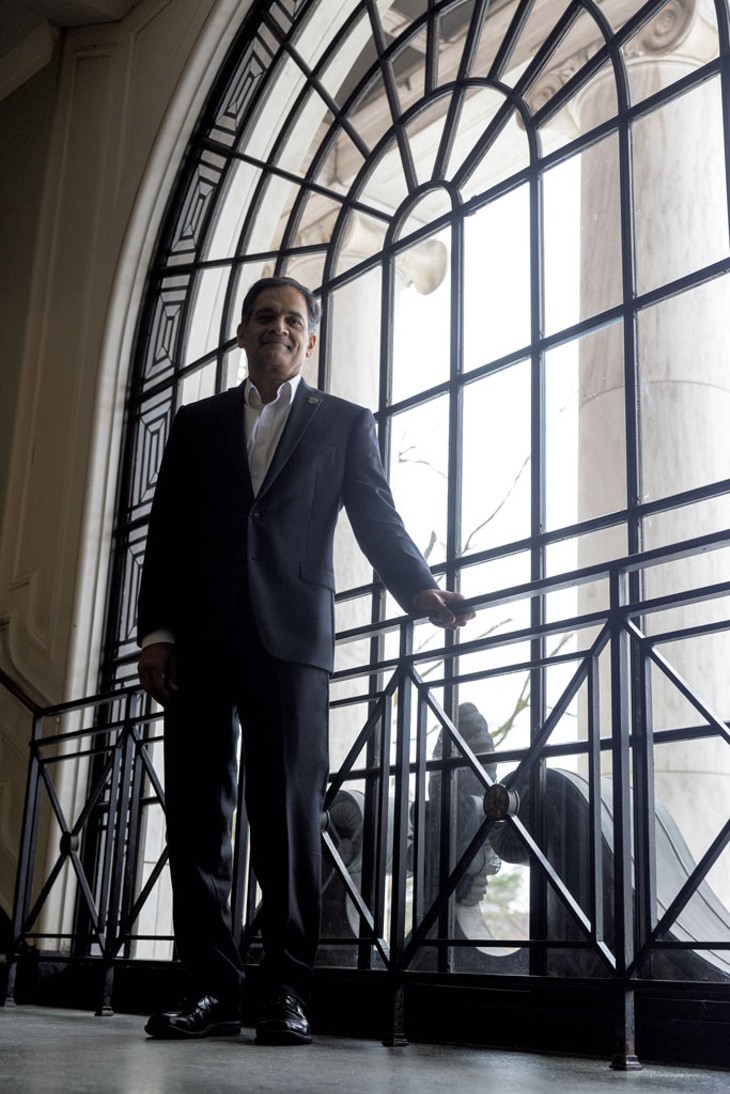
- James Buck
- Suresh Garimella
Garimella, the 27th president of UVM, came to Vermont from Purdue University just eight months before the onset of the pandemic. A mechanical engineer by training who grew up in central India, Garimella has helped UVM achieve its own improbable state of lift at a time when many other higher ed institutions are struggling to adapt to a post-pandemic world. Under his leadership, UVM has admitted the largest first-year class in its history, raised its profile in national rankings, and brought in millions more in research funding from corporate and government sponsors.
But three years into Garimella's tenure, Bernoulli the horse isn't the only member of the UVM community who might not recognize the president's face. Garimella's mass communication style, which tends to be heavy on prepared statements and scripted video messages, has not always endeared him to the university at large. His critics say he and his administration have sometimes failed to effectively communicate their priorities; as a result, their decisions can read as callous or haphazard, which has eroded trust between Garimella and large factions of the university community. As UVM has emerged from the worst days of COVID-19, Garimella's challenge has evolved from stewarding an institution through a crisis to making himself known to a community that doesn't necessarily hold a favorable view of him — or any view of him, for that matter.
Ron Lumbra, chair of the UVM board of trustees, blames this disconnect on the pandemic. "As he was on a trajectory to get to know people and for people to get to know him, it was completely interrupted by a crisis and all the negativity that comes with a crisis, where challenging decisions have to be made," Lumbra said. Recently, he noted, Garimella has been making an effort to reintroduce himself by inviting faculty to breakfast, attending UVM soccer games and participating in campus traditions, such as the university's Diwali festival, over which Garimella presided this October.
For his part, Garimella seems skeptical that the denizens of a state university might want a more personal connection, or at least the well-maintained illusion of one, with their president. "Fifteen thousand people aren't going to get to know me," he said. "I mean, I'm not unfriendly. I've never met anyone who has not kind of walked away, you know, fine with the interaction."
Finance 101
With more than 11,000 undergraduate and graduate students, 4,000 employees, and $1.3 billion in annual economic impact, UVM is one of the state's most complex systems. In Lumbra's view, Garimella's greatest strength is his ability to tune out the noise a complex system can generate.
"He is extraordinarily gifted in terms of being an objective, really brilliant, data-driven, fact-based leader and decision maker," said Lumbra, a partner at the executive search and consulting firm Heidrick & Struggles in New York City. Even at the height of the pandemic, Lumbra said, Garimella was unflappable: "Someone else might have easily been whipsawed by all the inbound, by all the mixed messages, by all the contradictory feedback. And he was solid as a rock the whole time."
Garimella's tenure at UVM has unfolded during a particularly turbulent period for higher education, in Vermont and the nation. Since 2018, four private colleges in Vermont — Marlboro, Southern Vermont, Green Mountain and St. Joseph — have folded under financial pressure. Last year, three of Vermont's state colleges, plagued by a shrinking pool of high school graduates and chronically low levels of state funding, agreed to merge into one unified system. Across the country, colleges and universities are undergoing a pandemic-hastened reckoning over the value of the education they provide; since fall 2020, undergraduate enrollment at four-year public schools has dropped 4.3 percent.
UVM, meanwhile, welcomed 3,000 first-year students in August, the largest first-year class in its history. While inflation has driven many colleges to increase tuition, Garimella announced in October that tuition and fees will remain flat in 2023 for a fifth straight year. Starting next fall, Vermonters from households with annual incomes of $60,000 or less will be eligible for full tuition scholarships to UVM — aided, in part, by Garimella's successful pitch to state lawmakers for an extra $10 million in funding, the first boost to the university's appropriations in nearly a decade and a half.
Garimella, a 2018 appointee to the board that oversees the National Science Foundation, has leveraged his connections in government and industry to increase research funding at UVM by 50 percent from the years before he took office, to an all-time high of $250 million in 2022. This year, UVM climbed 16 spots in the NSF's public research university rankings, coming in at No. 85 among 415 schools.
In his push to make UVM a top-tier research university and a training ground for Vermont's workforce, Garimella has found a powerful ally in retiring U.S. Sen. Patrick Leahy (D-Vt.). From his perch atop the Senate Appropriations Committee, Leahy has steered more than $56 million in federal earmarks toward UVM since 2019, for initiatives ranging from a food systems research program to a partnership with semiconductor manufacturer GlobalFoundries.
As current and former colleagues attest, Garimella can be quite persuasive. "Every time he shows me one of these things he's interested in, he convinces me immediately, and I'll go fight for the money," Leahy told Seven Days.
In the public relations department, Garimella has had a steeper learning curve. Presidents of big state schools rarely loom large in the average student's consciousness, and, in this respect, Garimella is no exception.
"I don't think some students even know he's the president, and they couldn't identify him from a lineup of people," said UVM senior and Student Government Association president Maddie Henson. But many faculty, too, feel that Garimella has been all but invisible, according to faculty union president and sociology professor Eleanor Miller. "I think he is widely unpopular," she said.
Over the past two years, Garimella's administration has faced sharp criticism over financial decisions that have fueled the perception that he is out of touch with some of the human-level concerns of his constituents. These include the permanent closure of UVM's Campus Children's School, which had provided daycare services for faculty and staff families since 1937, and the proposed elimination of more than two dozen academic programs, most of them in the humanities, which prompted campus protests and made national headlines.
In spring 2021, a petition of no confidence in Garimella and his administration, circulated by a coalition of faculty, students and staff called UVM United Against the Cuts, received more than 3,000 signatures.
In September, Garimella landed in the soup after local and national news outlets reported that the U.S. Department of Education's Office for Civil Rights had opened an investigation into allegations of antisemitism at UVM. The complaint, filed by two Jewish advocacy groups, claimed that the school administration had failed to adequately address several instances of perceived hostility toward Jewish students, including the alleged vandalism of the UVM Hillel building and social media comments by a teaching assistant who threatened to lower the grades of Jewish students who expressed support for Israel.
In a rare communiqué, Garimella, who has generally declined to weigh in on hot topics, defended his administration's responses to the incidents. He asserted that the complaint, and its portrayal in the media, "painted our community in a patently false light."
"When I saw that email, I wanted to leave this campus, like, immediately," said Evan Siegel, a member of the Hillel organization and a senator in the Student Government Association.
To many observers, the memo read as an apologia that seemed more concerned with protecting the university's image than acknowledging any harm to Jewish students. While Garimella and his administration have since taken other steps to show their support for Jewish students, including meeting with student leaders and releasing a more unequivocal statement condemning antisemitism, Garimella said in an interview earlier this month that he doesn't agree with the critical assessments of his initial response to the investigation. "It wasn't defensive, and it wasn't dismissive," he insisted. As he saw it, he was simply setting the facts straight.
But that episode seems to illustrate a larger issue surrounding his presidency. "People don't have a very strong understanding and awareness of, or opportunities to interact with, the president," said Thomas Borchert, a religion professor and the president of the faculty senate, which works with the administration to oversee academic affairs. "So when something happens, there's kind of a void, and people fill that with a variety of things, some of which are accurate and some of which are not."
World Literature
click to enlarge 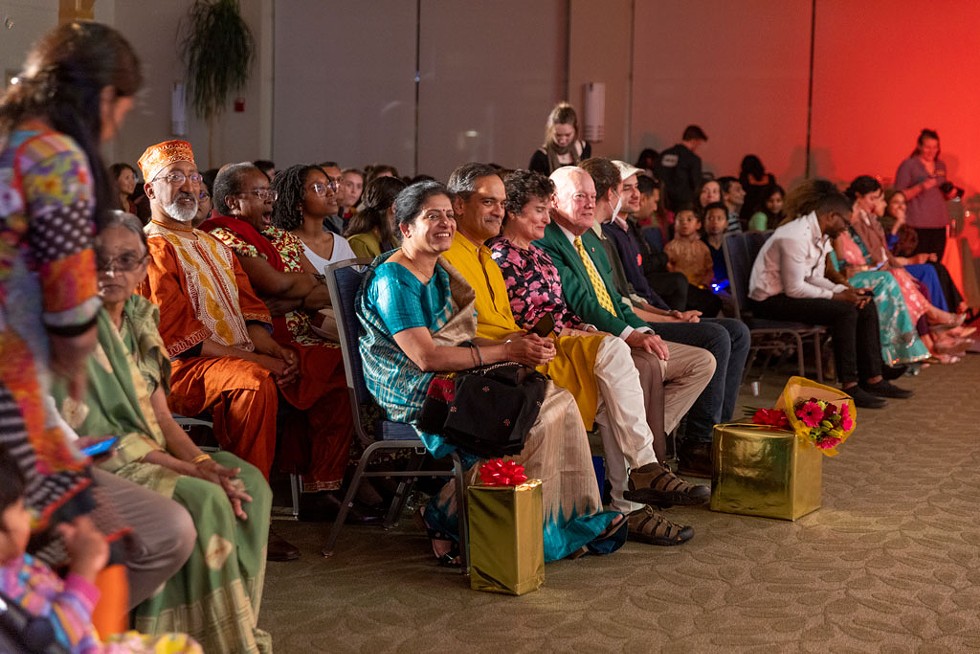

- James Buck
- Suresh Garimella and his wife, Lakshmi, attending a Diwali event in October
Garimella grew up in the city of Bhopal, in central India. Neither of his parents completed college, and they instilled in him and his two siblings an all-consuming drive to succeed in school.
"They didn't distract us with having people over and all of that," Garimella said. "When you don't have means, the only thing you can possibly have is education."
Garimella was a gifted student. He can still recall the praise of his first-grade teacher, Mrs. Nathaniel, who told him that if she had to have a kid, she'd want one like him. "It makes you feel special," he said, "and I was. I was good at class. I was good at many things."
Garimella seems to find it easiest to talk about himself in terms of the traits for which others have lauded him. He is deliberate and efficient in his speech; his sense of humor is just this side of parched. He clearly hates interviews. ("This is not a therapy session," he scolded when I asked him, at the beginning of our second interview, why he doesn't like to talk about himself.) He comes across as overwhelmingly cerebral, a frontal cortex dressed in a dark gray suit. It is hard to imagine him abandoning himself to a plate of spaghetti. One gets the sense, in his presence, that he meets his caloric needs by eating issues of the Economist.
In fact, Garimella is a zealous reader, a superfan of 19th-century English literature who professes to know "almost every other page" of Jane Eyre. When he was at the University of Wisconsin-Milwaukee, where he taught mechanical engineering for nine years before going to Purdue, he joined the local chapter of the Jane Austen Society of North America. "I was the only man," he said. "The only brown guy." Reading, and being well-read, are central to Garimella's identity. By the time he was 12, he said, he'd polished off most of the classics on his own. He laments that when he quotes poetry in conversation, few people seem to pick up on his references. "I remember a lot more poems than most people do," he said.
Garimella's encyclopedic knowledge of literature impressed UVM Honors College dean David Jenemann, who co-taught an undergraduate seminar on civil discourse with him in the spring. "Coming from engineering, one might assume that that's his land and that's where he would stay, but he really is a sort of broad-based interdisciplinary thinker," Jenemann said.
After graduating from high school, Garimella enrolled at the Indian Institute of Technology Madras, one of the country's top public universities for engineering. In his junior year at IIT, Garimella and several other students started a peer counseling group to help first-years cope with the stress of the academic environment, which is how he first discovered his love of mentoring and teaching.
As a professor, Jenemann said, Garimella is finely attuned to the social atmosphere — which students have had a lot to say, which ones have been quiet. According to Jenemann, Garimella instantly memorized the names of all 12 students in their class. "He knows who they are. He remembers things about them," he said. "It's a real skill he has."
IIT had a reputation as a pressure cooker — "much more intense than MIT," Garimella said, referring to the notoriously rigorous Massachusetts Institute of Technology. While he was in college, a friend who lived in the same dormitory died by suicide. "It was a very traumatic thing for me," he said. "I thought I should have prevented it." Earlier this month, after a UVM first-year took his own life, Garimella attended a gathering in the student's honor at the UVM Catholic Center. "I think we could all benefit from being kinder to each other," he said.
After graduating from IIT, Garimella came to the U.S. to earn a master's in mechanical engineering from the Ohio State University, then a PhD from the University of California, Berkeley. Following a stint as an associate professor of mechanical engineering in Milwaukee, in 1999, Garimella moved to Purdue, where he steadily climbed the ranks from associate professor to senior administrator. As the executive vice president for research and partnerships at Purdue, a role in which Garimella was charged with managing the university's $660 million research apparatus and developing strategic relationships with corporations, he reported directly to the university president, former Indiana governor Mitch Daniels.
"An awful lot of people in higher ed who are articulate and seem full of ideas never get much accomplished," Daniels said. "Suresh struck me early on as someone who made things happen in what, at least in higher ed, passes for a speedy fashion."
Garimella insists that if he were only interested in his personal fulfillment, he would have stuck to being a professor. ("There's no one who can claim to know more about being a faculty member than I can," he stated matter-of-factly during one of our interviews.) As president of UVM, he said, he believes that his responsibility is ensuring that the university contributes to the economic and cultural health of the state and expanding the pool of students for whom UVM is financially within reach. On Garimella's list of priorities: strengthening the school's relationships with state and community organizations, making UVM a regional hub for research in agricultural and life sciences, and bringing the school's resources to bear on the state's most pressing challenges, including the opioid epidemic and the workforce shortage.
His own path, which has led him from a working-class childhood in Bhopal to one of the most influential positions in Vermont, in which he earns $630,000 a year in salary and benefits, would not have been possible without the transformative power of education. A top goal, he said, is to make sure other students can have that same opportunity. "I don't want some rural person in Alabama, or heck, in Newport, to think UVM is way beyond their reach," he said.
Advanced Logic
Garimella seemed to be in high spirits when he addressed the attendees of the annual faculty awards dinner from the podium of the Davis Center's Grand Maple Ballroom on November 3. "I hope you all agree with the sense I have and the feeling I get that UVM is doing really, really well, and that's because of you," Garimella said to the 115 or so faculty seated before him, who were politely refraining from eating their salads.
"I mean, just look at the last three years," Garimella continued. "These were among the most challenging years in the country and in the world, certainly for us. And what do we come out with? We come out with our research ranking jumping, what, 16 spots or so, our research funding having exceeded a quarter billion dollars, with a 'b.'"
After he ran down the list of UVM's other recent accomplishments, he encouraged faculty to nominate each other for external awards. "There are universities that are machines for nominating for awards and things. I think we could do more," Garimella said. "If, somehow, a letter from me is helpful, let me know, and I'll be happy to write a letter. And you can tell me what to say, and I'll say it."
Two and a half years ago, Garimella was telegraphing a much more somber message. In May 2020, after the onset of the pandemic had turned the UVM campus into a ghost town, Garimella sent out a grim school-wide memo outlining the anticipated effects of COVID-19 on the university's bottom line. He cited national surveys suggesting that colleges and universities might see as much as a 20 percent dip in enrollment in the next few years; at UVM, where 73 percent of the student body comes from outside Vermont, he noted that an expected drop in out-of-state applicants would significantly decrease the school's revenue. Facing $15 million in immediate pandemic-related costs, Garimella warned, belt-tightening could become necessary.
UVM had already announced that the teaching assignments of nearly 70 nontenure track lecturers would be reduced by 25 percent the following academic year, resulting in an outcry from students, staff and faculty. (After months of pressure, the administration would eventually reverse course on this plan in September 2020.) Then, in late May, Scott Thomas, dean of the College of Education and Social Services, announced that the UVM Campus Children's School would be closed for good.
The school had provided childcare for about 60 staff and faculty families and served as a hands-on teaching environment for students in UVM's early childhood development program, said Barbara Burrington, who was the school's interim director when it was shuttered. When she started her job in 2016, the UVM administration, under then-president Tom Sullivan, was already looking for ways to trim the center's costs and increase its relevance to the university's academic mission. But when Garimella took office, Burrington said, she sensed a change in tone from the top.
"He looked at everything through the same lenses — the financial lens, the community relationship lens, the 'who do we serve' lens, the equity lens, the diversity lens — not as an empath, not as a humanitarian, but as a leader of a business with thousands of employees serving thousands of students," she said. "And so the call went from thinking about the problem to acting on the problem."
The closure met fierce opposition from parents and faculty, who decried it as a shortsighted measure that would hobble the university's recruitment and retention efforts, particularly for young female employees.
A year later, UVM secured 42 daycare slots for faculty and staff at the nearby nonprofit Trinity Children's Center, which leases one of the buildings on the university-owned Trinity College campus. (In 2023, UVM plans to increase the number of slots at Trinity to 50.) Trinity offers a limited number of classroom placements for UVM's early childhood development students; aside from a $250,000 up-front investment to upgrade the Trinity facilities, the university does not pay for daycare services.
In Garimella's view, the new arrangement is a no-brainer. To accommodate 60 families, he said, UVM had been paying $550,000 a year. Why should those families "get that kind of subsidy," he asked, "and not everybody else?"
Intro to Mass Communication
click to enlarge 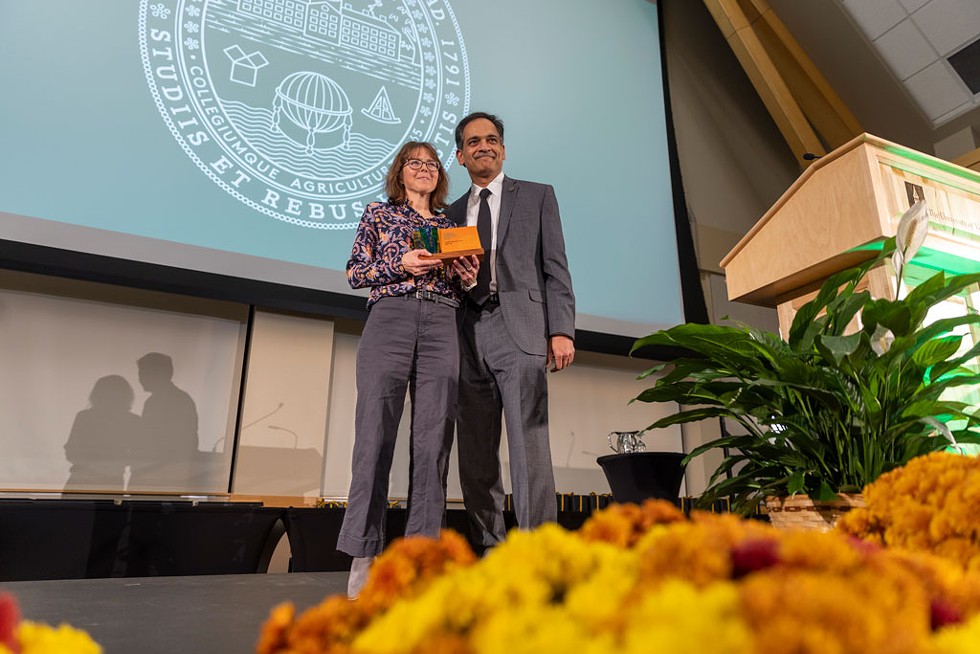

- James Buck
- Suresh Garimella presenting an award to Karen Benway at a faculty awards dinner
To many UVM students, Garimella exists primarily as a disembodied voice.
"I don't know what he looks like," junior Henry Clapp said on a recent Friday afternoon on the front lawn of Lambda Iota, on the corner of Pearl and North Prospect streets, where Clapp and several of his companions had set up an al fresco beer pong table. In the first-floor lounge of the Davis Center, first-year student Charlie Vibert described Garimella's emails, his primary mode of communication with the student body, as "could be a little bit better or, like, severely out of pocket," referring to his recent campus-wide blast regarding the antisemitism investigation.
In the three years Garimella has been president of UVM, he has granted just one on-the-record interview with the student newspaper, the Vermont Cynic, according to the paper's past and present editors. At the beginning of Garimella's first semester on campus, in September 2019, Sawyer Loftus, then the Cynic's news editor, sat down with him for approximately 45 minutes in the president's ceremonial office, a dark, wood-paneled study in the Waterman Building reserved for formal meetings. As Loftus recalls, their conversation was pleasant.
"He's very charismatic. He's well-spoken," said Loftus, who graduated from UVM in 2021 and now works as a reporter at the Bangor Daily News in Maine. "He made a joke, but I can't remember what it was."
The following January, the Cynic covered a trustee meeting that included a discussion of a legislative proposal that would require gender parity on the board, which, at the time, consisted of 19 men and six women. The article quoted an off-the-cuff joke Garimella had made during that session: "You could fire me and hire a woman." In a statement to the Cynic, a university spokesperson noted that Garimella's remark had been intended as "light-hearted."
According to Loftus and Bridget Higdon, who was editor in chief at the time, that story seemed to mark a decisive turn in the relationship between Garimella and the student paper. As editor, Higdon would have monthly off-the-record meetings with the president, and, during her next one-on-one check-in with Garimella, she said, he confronted her about the story.
"He got emotional and was visibly angry," recalled Higdon, who is now the managing editor of the St. Albans Messenger. "He raised his voice. As a student alone with an administrator, it made me uncomfortable." Higdon no longer remembers the exact words Garimella used, but his clear message, she said, was that he hadn't liked the way he'd come across in the article.
After a few minutes, Higdon said, Garimella calmed down and apologized, but the incident upset her so much that she told a faculty member. After that, she requested that her monthly conversations with Garimella be conducted on the record — "not because I wanted to write stories about everything that was said," she explained, "but because it felt like a way to protect myself." Through his spokesperson, Higdon said, Garimella did not agree to those terms. (Asked about the encounter with Higdon, Garimella said that his frustration was about the Cynic's depiction of the board, not him.)
A month later, the pandemic forced everyone off campus, and Higdon had one last meeting with Garimella, via Zoom, during which she introduced Loftus as the incoming editor in chief. Garimella's demeanor in that meeting, she said, was courteous and professional.
"He hoped we would be respectful and responsible journalists," Higdon recalled him telling her and Loftus, "and that we knew that the administration was working hard during the pandemic to make sure everything was as good as it could be."
Garimella has continued his monthly off-the-record meetings with the Cynic's subsequent editors in chief, but he hasn't granted another interview since. Ella Ruehsen, the current top editor, said the paper has stopped asking. "We assume that won't be fruitful," she said.
Accounting 101
In December 2020, Bill Falls, dean of the College of Arts and Sciences, revealed a proposal to gradually phase out 26 academic programs — all told, 12 majors, 11 minors and four graduate programs — to defray a projected $8.6 million budget shortfall. The cuts have not been implemented, and the faculty senate is still vetting the plan. But the shock of that announcement still reverberates in certain corners of the campus.
"If there's trust that has been rebuilt between the administration and the faculty, I think it remains fairly fragile," said Borchert, the faculty senate president and religion professor, whose department was among those slated for the chopping block.
Garimella denies the oft-repeated charge that the proposed cuts reflected a mandate from his office to siphon funds away from the humanities. He said each of the university's colleges undertook a similar analysis of their programs to determine which ones weren't attracting as many students — and to see, in the corporate euphemism that has crept into academia, where efficiencies might be gained.
The goal of the exercise, Garimella said, was to galvanize faculty across the university to think critically about their offerings and adapt them to match student demand. "It seems very fair to sunset a program that has no interest and reinvest in the programs that do have interest," he said.
As he is quick to point out, no faculty jobs have been eliminated so far as a result of the proposal, aside from three College of Arts and Sciences senior lecturers whose contracts were not renewed around the time the cuts were announced. And he dismissed the notion that the proposal had anything to do with the extended tuition freeze; if anything, he said, the College of Arts and Sciences seems to be doing better than ever. This year, the college got the green light to hire 24 new faculty members; by next year, the administration will have increased the school's budget by more than $5 million. Enrollment at the College of Arts and Sciences is at a 10-year high, Garimella noted, from which he concludes that the school must be doing something right in scrutinizing its programs.
"There was a lot of angst about the cuts, looking back," he said, "but it seems to have escaped people's consciousness, as far as I can tell."
To put a finer point on this, Garimella cites the newly launched School of the Arts, which combined the school's theater, music, dance, creative writing, studio art, film and television studies, and art history programs in an effort to make the arts curriculum at UVM more cohesive and, not incidentally, appealing to donors. The School of the Arts emerged, in part, because of the pressure the proposed cuts placed on faculty to reenvision their jobs and their departments, said Kelley Helmstutler Di Dio, an associate dean in the College of Arts and Sciences and the school's executive director. "It absolutely made people come to the table and start thinking like, Oh, crap, this could really happen, and I need to really take it seriously and find a different pathway forward," she said.
According to Helmstutler Di Dio, Garimella has been one of the school's biggest champions. "He certainly could have made a decision, as other presidents across the country did, to look at the arts and see that we do not bring in multimillion-dollar grants and see that our classes have to be small because of the nature of art-making," Helmstutler Di Dio said. "He could have made the decision that the College of Arts and Sciences could save a bunch of money just by closing the arts. That was never discussed."
Garimella tends not to look back once he's made up his mind, according to Marietta Harrison, a retired professor of biochemistry and molecular biology at Purdue who worked as an adviser to Garimella when he was the university's executive vice president for research and partnerships. "He doesn't angst over decisions very much," she said. "He asks lots of different opinions, and once he has all the input he wants, he moves forward. He doesn't wring his hands a lot and try to second-guess everything."
Nor, it seems, does Garimella enjoy being second-guessed, which comes with the territory of being a university president. For Garimella, the College of Arts and Sciences drama has had a particularly aggravating half-life. Sometimes, he said, "some smart-ass will say something to me in the streets, some student who thinks they know what they're talking about and are very rude. They don't know what they're talking about, but because somebody told them this, they believe it." He then interrupted himself and tried to amend his choice of words. "The smart-ass thing comes off," he commanded, pointing at my iPhone, which I was using to record our interview. He proceeded. "It's just depressing to me that people can be taken in."
When UVM decided to bring students back to campus in fall 2020, Garimella said, he got similarly critical letters from Burlington residents, who were anxious that recklessly socializing coeds would turn the city into a COVID-19 petri dish. "How many body bags do you need to see before you realize the error of your ways?" Garimella said, paraphrasing one comment. "Well, there were no body bags."
Garimella, who spent upwards of $15 million on a university-wide testing program, vats of hand sanitizer and football fields worth of plexiglass to ensure that UVM could operate safely, believed that staying open was the right thing to do. In the end, the public health disasters his critics predicted did not come to pass.
"There was a simple driving principle, which is pretty much how I do a lot of things," he said. "You have a clear strategy, a clear goal. And then you do whatever it takes to get you there."
Corrections, November 30, 2022: The 24 new faculty members are for the College of Arts and Sciences; an earlier version of this story contained an error. Also, Karen Benway's name was misspelled in a photo caption in an earlier version.
The original print version of this article was headlined "Meet the President | Suresh Garimella has helped UVM emerge stronger from the pandemic. But who is he, anyway?"
Got something to say?
Send a letter to the editor
and we'll publish your feedback in print!
About The Author
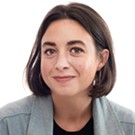
Chelsea Edgar
Bio:
Chelsea Edgar is a staff writer for Seven Days, and has written for BuzzFeed and Philadelphia magazine.
Chelsea Edgar is a staff writer for Seven Days, and has written for BuzzFeed and Philadelphia magazine.
More By This Author
Latest in Education
Related Locations
-
University of Vermont
- 85 S. Prospect St., Burlington Burlington VT 05401
- 44.47828;-73.20116
-
 802-656-3131
802-656-3131
- www.uvm.edu/
Related Stories
Speaking of...
-

UVM Swimming and Diving Overcomes Budget Cuts to Win Conference for the First Time in Its History
Mar 13, 2024 -

The Mobile Broccoli Bar Sprouts a New Outpost at the University of Vermont
Feb 27, 2024 -

Records Show UVM Professors Questioned Decision to Nix Palestinian Writer’s Appearance
Dec 20, 2023 -

UVM Strikes Deal With Burlington That Could House More Students on Campus
Dec 18, 2023 -

Concert Benefits an Endangered UVM Classics Program
Nov 29, 2023 - More »


























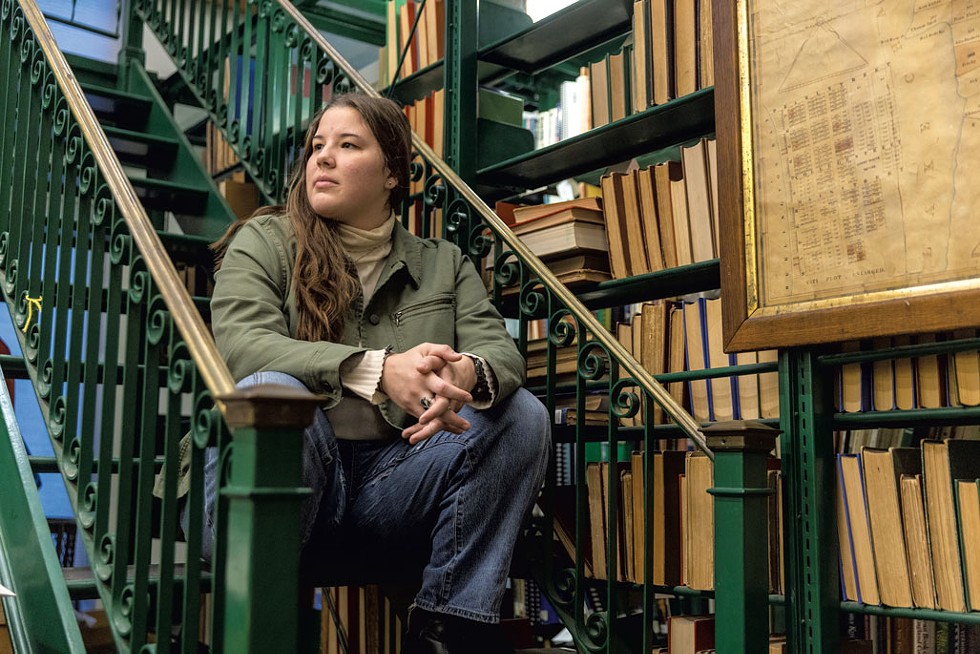
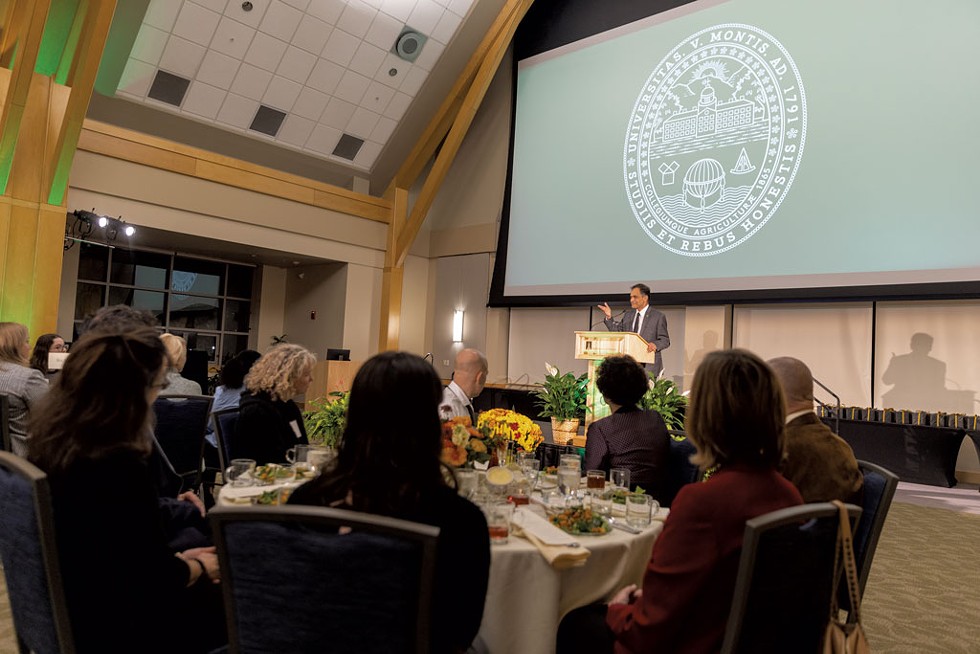






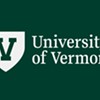
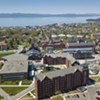
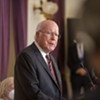
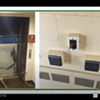

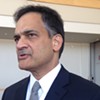


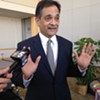
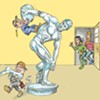
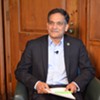
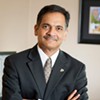

find, follow, fan us: